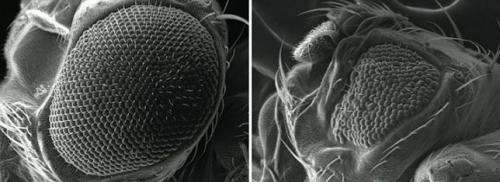Researchers abuzz over caffeine as cancer-cell killer

(Medical Xpress)—Researchers from the University of Alberta are abuzz after using fruit flies to find new ways of taking advantage of caffeine's lethal effects on cancer cells—results that could one day be used to advance cancer therapies for people.
Previous research has established that caffeine interferes with processes in cancer cells that control DNA repair, a finding that has generated interest in using the stimulant as a chemotherapy treatment. But given the toxic nature of caffeine at high doses, researchers from the faculties of medicine and dentistry and science instead opted to use it to identify genes and pathways responsible for DNA repair.
"The problem in using caffeine directly is that the levels you would need to completely inhibit the pathway involved in this DNA repair process would kill you," said Shelagh Campbell, co-principal investigator. "We've come at it from a different angle to find ways to take advantage of this caffeine sensitivity."
Lead authors Ran Zhuo and Xiao Li, both PhD candidates, found that fruit flies with a mutant gene called melanoma antigen gene, or MAGE, appeared normal when fed a regular diet but died when fed food supplemented with caffeine.
On closer inspection, the researchers found that the mutant flies' cells were super-sensitive to caffeine, with the drug triggering "cell suicide" called apoptosis. Flies fed the caffeine-laden diet developed grossly disfigured eyes.
Through this work, the research team identified three genes responsible for a multi-protein complex, called SMC5/SMC6/MAGE, which regulates DNA repair and the control of cell division. Neither process works properly in cancer cells.
Co-principal investigator Rachel Wevrick explains that this finding is significant because it means that scientists one day could be able to take advantage of cancer-cell sensitivity to caffeine by developing targeted treatments for cancers with specific genetic changes. Their results were published in the March issue of the peer-reviewed journal PLOS One.
"Unless you actually know what it is those proteins are doing in the first place to make a cell a cancer cell instead of a normal cell, it's hard to know what to do with that information," she says. "You need to know which genes and proteins are the really bad actors, how these proteins work and which of them work in a pathway you know something about where you can actually tailor a treatment around that information."
Along with Wevrick and Campbell as lead investigators, the project also included biological sciences professor Kirst King-Jones and medical geneticist Sarah Hughes. It's the type of research-intensive environment that benefits students who gain experience working with peers as part of a team, Wevrick says.
"The U of A has a reputation for co-operation, and that's not the case everywhere. People here are very willing to share their results and their successes, and work together."
More information: www.plosone.org/article/info:d … journal.pone.0059866













